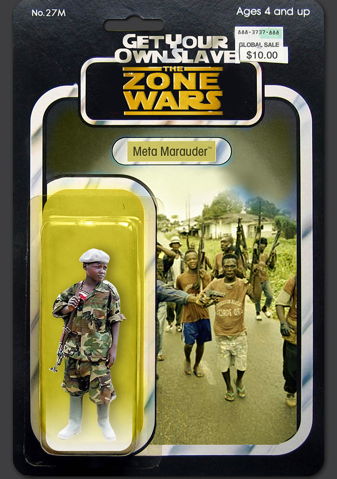
'Wanna own your own slave?" Jason asked over coffee in his California kitchen one morning last week.
I stared blankly and took another sip.
"Here," Jason said, sliding a stack of what looked a bit like ''Star Wars'' trading cards at me across the counter.
Jason Pearson, an artist and west suburban native who is married to one of my best friends, is a terribly creative and deeply spiritual fellow. In his inimitably understated way, I'm never sure whether what he hands me is going to be goofy or deadly serious. This time, it was the latter.
I began flipping through the stack of cards, trying to focus on the glossy images. Instead of Darth Vader or R2D2, the characters on the cards bore names such as "Lad-e-Boy B" from "The Return of the Red Light," "Meta Marauder" from "The Zone Wars" and "NoKid Ney" from "Revenge of the Organ Trade."
Across the top of each of the cards were the words, "Get Your Own Slave" and a price tag: "Global Sale: $800" or, in the case of the "Meta Marauder," "Global Sale: $10."
On the back of each card are staggering statistics:
• There are 27 million slaves worldwide.
• Slave traders made $32 billion last year.
• The average cost of a slave is $90.
• More than one-third of all prostitutes in South and East Asia are children.
• More than 17,500 people are trafficked as slaves to the U.S. each year.
• Fifty percent of slaves in the U.S. work in agriculture, manufacturing or domestic work.
Across the bottom of each was the simple phrase:
"Trade cards, not people."
Jason created the playing cards and accompanying Web site, www. getyourownslave.com, to support a new film about the global slave trade called Call Response that's making the rounds in theaters across the nation, including a short run at Piper's Alley in Chicago last month.
The brainchild of Justin Dillon, a San Francisco Bay-area musician, Call Response -- described as a "rockumentary" by its maker -- weaves raw footage shot undercover in brothels and sweatshops in the developing world with talking heads such as Cornel West and the activist/actress Ashley Judd, and live music performances from such disparate artists as Imogen Heap, Moby, Matisyahu, Natasha Bedingfield and the Sudanese rapper, Emmanuel Jal. Jal was taken from his family as a young boy in 1987 and forced to fight in two civil wars in five years for the Sudan People's Liberation Army as a child soldier before he was rescued by a British humanitarian worker.
The 84-minute film, released earlier this fall without fanfare or any formal advertising budget, seeks to raise awareness about and catalyze action for the abolition of global slavery. Still. Today. In 2008.
More than 165 years since slavery became illegal in the United States. Sixty years since the General Assembly of the United Nations adopted the Universal Declaration of Human Rights, which states, in part: "No one shall be held in slavery or servitude; slavery and the slave trade shall be prohibited in all their forms."
It's a shameful phenomenon that hadn't hit the radar of most folks I know until recently, thanks in part to Call Response.
There are more slaves in the world today than were taken during 400 years of the trans-Atlantic slave trade, according to the film. Of the 27 million slaves worldwide, half are children and 80 percent are female.
One of the most affecting scenes in the "rockumentary" is of an adolescent sex worker somewhere in Asia. In a quavering, small voice the wan little girl explains that she's been a sex slave for six years and has sexually serviced about 1,000 men a year for each of those years. She has never been to school so she can't do the math to add them all up to the staggering 6,000 total.
Heartbreaking and maddening at once, the film made me want to do something more than just send the suggested text message to legislators or $5 to one of the organizations that make up the global abolition movement, such as the International Justice Mission, Free the Slaves, the International Princess Project or Not for Sale.
"I created www.getyourown slave.com as way to put the Web site visitor in the shoes of slave trader -- by forcing you to answer the same questions that you would if you were buying a human being," Jason says.
The site asks visitors what country they'd like their slave delivered to, the age of the slave (choices range from 4 to 31), what they will be using the slave for (domestic servitude, prostitution, soldier, forced labor, organ removal), and the gender of the slave. At the end, the "slave" appears like an action figure, packaged in plastic with a description and price tag.
"The last step is a bit of a surprise and, while blatantly obnoxious, will resonate with anyone who grew up in the '70s," Jason said. "The final goal of the Web site is to challenge the visitor to make a donation to an abolitionist organization, and I will send them a set of limited-edition collectible cards -- because I think we need to trade cards, not people."
For more information on Call Response and global slavery, go to www.callandresponse.com.